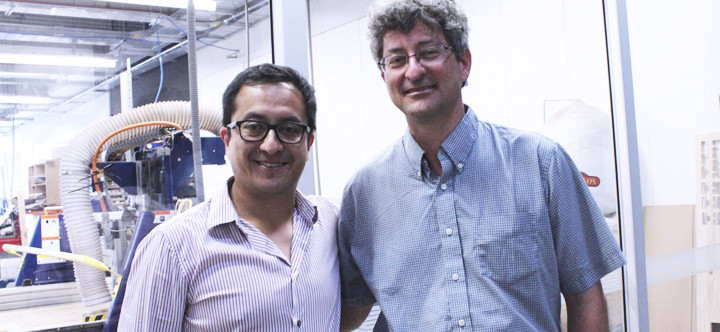Meet Carlos Ríos and Joost Vlassak, the professors in charge of the UTEC-Harvard Collaborative Project

Carlos Ríos and Joost Vlassak are the leaders of the UTEC-Harvard Collaborative Field Program.Together, they design the edition each year and once in the field, they advise students on their solution proposals. This year, they incorporated agriculture as a variable for the prevention of illegal mining in Madre de Dios. But, how does this program work? Their mentors say:
Carlos Ríos
I would say that the program is focused on the students. They are exposed to a different reality and have to propose solutions to a problem. It is in that environment where they develop skills.
Joost Vlassak
I think it's important to say that there is not a single solution. They collect the information they receive and try to handle the problem.
Professor Vlassak has been leading the program since 2014, while Professor Ríos joined it in 2017. From that first edition to the current one, there has been an undeniable evolution, where improvements were made with the intention of bringing the students closer to the problem.
JV:
The first time, in 2014, was very different. We spent all our time in Lima and on short trips, It was a good experience, but what we do now is much more realistic, since we spend much more time in the field analyzing real needs.
CR:
I think it has been a constant learning experience for me. The program has evolved a lot and I am very curious about what will happen next.

In the 2018 edition, the students proposed the development of a device capable of measuring the level of nitrogen, phosphorus and potassium in the soil in order to determine their fertility. By the end of that year they concluded with the construction of the system to analyze phosphorus. This year, the participants had meetings with local farmers in Cusco to learn about the context they face and the opportunities for improvement.
JV:
Last year was very successful. I think that this year's program from the student's point of view was even more successful. It was more difficult because there were more human factors in the development of solutions.
CR:
For me it was very nice. I think it was worth it for the students to talk to the farmers and understand different perspectives. It was very revealing. The group was very compact. We had a very good atmosphere.
JV:
Last year they spoke with the miners and for this edition they spoke with farmers. I think it is obvious that we can not do anything about the extraction of gold, there is no way to change that, but at least we can make agriculture more attractive to farmers.

But where is the importance of this program? And, what do they think is the impact that the program has on students?
JV:
Being able to talk to farmers and have first-hand information, from the point of view of education, is a very important aspect. The other aspect is that you are outside of your comfort zone and you are exposed to a completely different world.
CR:
The importance is in the students. UTEC and Harvard work together to solve a problem, but that is the second part. The process is the most important aspect. This experience can help them to be open to new and different cultures.
Participating in the UTEC-Harvard Collaborative Field Program may be an important step in the students' academic experience, but it has also had a great impact on both teachers.
JV:
I have learned a lot, especially on this trip and also last year. It is a very special program. I think it's very fun to work with students, expose themselves to a different culture, see how they get along and how they interact.
CR:
I find it very rewarding. It has impacted me a lot, which is very important for me as a teacher.
MORE INFORMATION
Carlos Ríos Pérez has a Ph.D. in Mechanical Engineering from the University of Texas, worked on the development of new composite materials for diamond drills in mining exploration and has conducted research on transport phenomena. For three years, and after a long time outside Peru, he is part of UTEC as Professor of Heat Transfer and Thermodynamics. In 2017 he took on another challenge: being a leader in one of the most important programs of the university: the Collaborative Field Program with Harvard University, where he is also Associate Professor.
Joost Vlassak, Professor Abbott and James Lawrence of Materials Engineering at Harvard, has a Ph.D. in Materials Science from Stanford University. He studies thermomechanical behavior and recently, he pioneered the use of combinatorial nano calorimetry for the development and analysis of complex material systems. He is part of the collaborative program between UTEC and Harvard since 2014.
*This project was funded in part by a grant from the U.S. Department of State, Embassy of the United States in Lima Peru, Cultural Affairs Section, and administered by Partners of the Americas. The opinions, findings and conclusions stated herein are those of the author(s) and do not necessarily reflect those of the U.S Department of State or Partners of the Americas.